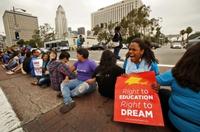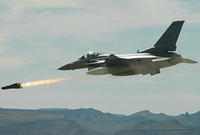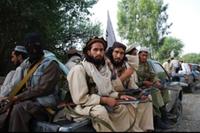-
NYPD, Microsoft develop and deploy new surveillance system
The New York Police Department (NYPD) and Microsoft have teamed up to create the Domain Awareness System, which will analyze real-time safety data for use by NYPD investigators; the system will act as a communications hub which will allow a number of advanced counterterrorism systems to relay information to more than 1,000 people in the field
-
-
Advanced explosives detector sniffs out previously undetectable amounts of TNT

TNT and other conventional explosives are the mainstays of terrorist bombs and the anti-personnel mines that kill or injure more than 15,000 people annually in war-torn countries; in large, open-air environments, such as airports, train stations, and minefields, concentrations of these explosives can be as small as a few parts of TNT per trillion parts of air, making it impossible for conventional bomb and mine detectors to detect the explosives and save lives
-
-
Domestic terrorism by members of extremist groups a serious threat: FBI
The FBI and other government law-enforcement agencies have been convinced for a while that terrorism from extremist domestic organizations is just as dangerous as terrorism from foreign organizations, but efforts by authorities to detect and pre-empt violent extremists have faced serious legal and political hurdles, including free speech guarantees and pushback from political lobbies suspicious of the government’s motives
-
-
NIST ballistic standard tie Guns to criminals and crime scenes
Nearly 200,000 cartridge cases are recovered annually at U.S. crime scenes; thanks to a new reference standard developed by the National Institute of Standards and Technology (NIST), law enforcement agencies will have an easier time linking these cartridge cases to specific firearms
-
-
New detection device for forensic and security applications
A new biological sampling and detection device could soon be used by first responders in the forensic and security sectors; the patented technology allows for rapid sampling of up to eight targets simultaneously, testing powder, liquids, or surfaces directly and has applications across the forensic and security areas
-
-
USDA’s proposed chicken safety inspection policy could mean trouble for consumers
The federal government has come up with a new proposal to examine chickens for contaminates and diseases, and the proposal has some people concerned and others outright scared; the proposal would reduce the number USDA food safety inspectors at poultry plants from four to one – and rely on plant’s employees to do safety inspections instead
-
-
Drones used by police, firefighters raise privacy concerns
DHS is accelerating the use of unmanned drones by police and firefighters around the country with the intent of detecting fires, radiation leaks, and other potential threats, but Congress and privacy advocacy organizations think the se of drones raises several privacy issues
-
-
Improved disaster resilience is imperative for U.S: report
A new report from the National Academies says that it is essential for the United States to bolster resilience to natural and human-caused disasters, and that this will require complementary federal policies and locally driven actions that center on a national vision – a culture of resilience; improving resilience should be seen as a long-term process, but it can be coordinated around measurable short-term goals that will allow communities better to prepare and plan for, withstand, recover from, and adapt to adverse events
-
-
Obama’s sweeping immigration initiative goes into effect next week

On 15 August 2012 a sweeping new immigration initiative, the most significant easing of immigration policy since President Ronald Reagan granted amnesty to an estimated three million people in 1986, goes into effect; it would defer deportation action against, and grant a work permit to, illegal immigrants who meet certain criteria
-
-
Critics charge Obama initiative is amnesty by executive order
Critics of the Obama administration’s immigration order charge that the administration is”legislating by executive edict”; they say that the Obama administration is set, in effect, to begin implementing the DREAM Act amnesty on 15 August, even though the legislation was defeated by Congress as recently as December 2010
-
-
DHS develops active shooter national guidance
DHS has selected a training program from the Center for Personal Protection and Safety (CPPS) as resource in developing national guidance for how to respond to an active shooter situation
-
-
Critics charge DHS chemical plant security program a failure
In 2006 Congress passed the Chemical Facility Anti-Terrorism Standards program, or CFATS, which set security standards chemical plants had to meet; there are 4,400 chemical plants covered by CFATS, of which 120 are considered especially dangerous, as a chemical release– accidental or as a result of a terrorist act — in any one of them would cause hundreds of thousands of casualties; after four-and-half years and $480 millions spent on CFATS, not a single plant of the 4,400 had been fully inspected; of the 120 riskiest plants, 11 had a preliminary inspection done; not a single site security plan has been approved
-
-
Israel estimates an Iranian retaliation would kill 200-300 Israeli civilians

The operation research experts at the Israeli Ministry of Defense estimate that an Iranian retaliation for an Israeli attack on Iran’s nuclear facilities, a retaliation in which Hezbollah would participate, would cause about 200 dead among Israeli civilians; if Syria were to join the attack on Israel, the number of dead would rise to about 300; the estimates are based on past conflicts, the efficacy of Israeli missile defense system, the number of fortified shelters available, and the generally disciplined manner in which Israeli civilians reacted to being under missile and rocket attacks
-
-
Under industry pressure, DHS drops chemical plant employee screening proposal

Security experts agree that short of a nuclear attack on a U.S. city, the most casualty-heavy disaster would occur as a result of an accident in, or a terrorist attack on, a chemical plant which would release a cloud of toxic fumes; there are about 15,000 plants in the United States which produce, process, use, or store volatile and toxic chemicals; more than 300 of the these plants are so close to large population centers, that a chemical release in any one of them would cause more than 50,000 casualties; DHS wanted to have employees in these plants screened for potential ties terrorism, but the chemical industry objected, saying this would be too costly; last Thursday DHS pulled the proposal
-
-
U.S. losing patience with Pakistan over Haqqani network’s growing boldness

Last week the Pakistan government-supported Haqqani network released a video of a 1 June operation, showing members of the group driving an explosive-laden truck into Camp Salerno, an American military base in Afghanistan, near the Pakistani border; the truck exploded, opening a breach in the camp’s fence, through which Haqqani militants entered the camp, shooting in all directions; only two GIs died in the attack — but it could have been far worse, as hundreds of American soldiers were in the mess hall only yards away; Congress has already voted to designate the Haqqanis as a Foreign Terrorist Organization (FTO), and administration officials say that the United States is “one major attack” away from unilateral action against Pakistan
-
More headlines
The long view
Factories First: Winning the Drone War Before It Starts
Wars are won by factories before they are won on the battlefield,Martin C. Feldmann writes, noting that the United States lacks the manufacturing depth for the coming drone age. Rectifying this situation “will take far more than procurement tweaks,” Feldmann writes. “It demands a national-level, wartime-scale industrial mobilization.”
No Nation Is an Island: The Dangers of Modern U.S. Isolationism
The resurgence of isolationist sentiment in American politics is understandable but misguided. While the desire to refocus on domestic renewal is justified, retreating from the world will not bring the security, prosperity, or sovereignty that its proponents promise. On the contrary, it invites instability, diminishes U.S. influence, and erodes the democratic order the U.S. helped forge.
Fragmented by Design: USAID’s Dismantling and the Future of American Foreign Aid
The Trump administration launched an aggressive restructuring of U.S. foreign aid, effectively dismantling the United States Agency for International Development (USAID). The humanitarian and geopolitical fallout of the demise of USAID includes shuttered clinics, destroyed food aid, and China’s growing influence in the global south. This new era of American soft power will determine how, and whether, the U.S. continues to lead in global development.
Water Wars: A Historic Agreement Between Mexico and US Is Ramping Up Border Tension
As climate change drives rising temperatures and changes in rainfall, Mexico and the US are in the middle of a conflict over water, putting an additional strain on their relationship. Partly due to constant droughts, Mexico has struggled to maintain its water deliveries for much of the last 25 years, deliveries to which it is obligated by a 1944 water-sharing agreement between the two countries.
How Disastrous Was the Trump-Putin Meeting?
In Alaska, Trump got played by Putin. Therefore, Steven Pifer writes, the European leaders and Zelensky have to “diplomatically offer suggestions to walk Trump back from a position that he does not appear to understand would be bad for Ukraine, bad for Europe, and bad for American interests. And they have to do so without setting off an explosion that could disrupt U.S.-Ukrainian and U.S.-European relations—all to the delight of Putin and the Kremlin.”
How Male Grievance Fuels Radicalization and Extremist Violence
Social extremism is evolving in reach and form. While traditional racial supremacy ideologies remain, contemporary movements are now often fueled by something more personal and emotionally resonant: male grievance.
